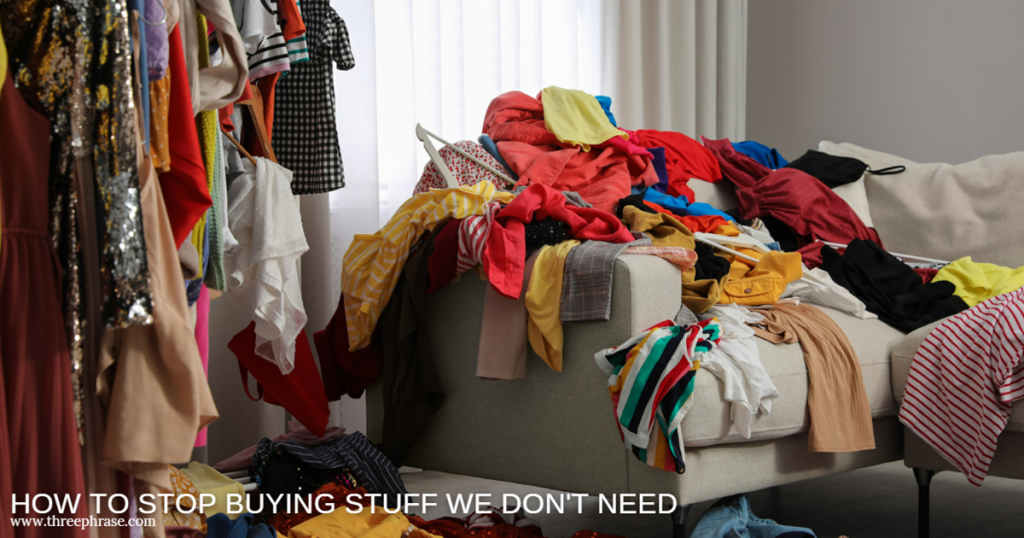How to Stop Buying Stuff We Don’t Need and Why Over Shopping Is a Problem

In today’s consumer-driven society, it’s easy to fall into the trap of over shopping, accumulating piles of stuff we don’t need. From impulse buys to trendy gadgets, our homes often become cluttered with items that serve no real purpose in our lives. But why do we keep buying things we don’t need? And more importantly, how can we break free from this cycle of over consumption? In this article, we’ll delve into the reasons behind our tendency to over shop and explore practical strategies to curb unnecessary spending and live a more intentional, clutter-free life.
Understanding Why Over Shopping Is a Problem
By addressing the underlying factors that contribute to the urge to over shop, we can become more mindful of our purchasing habits and take steps to cultivate healthier coping mechanisms for managing stress, boredom, and social pressure. Here are the reasons that affect how we decide to buy:
1. Emotional Triggers:
- Stress: When we feel stressed or overwhelmed, shopping can provide a temporary escape or distraction. The act of browsing or making purchases can release feel-good neurotransmitters like dopamine, temporarily alleviating stress.
- Boredom: In moments of boredom, shopping can seem like an exciting activity to fill the void. The thrill of discovering new items or making impulse purchases can temporarily relieve feelings of monotony.
- Social Pressure: Whether it’s keeping up with the latest trends or trying to fit in with peers, social pressure plays a significant role in driving unnecessary spending. We may feel compelled to buy certain items to maintain a certain image or status within our social circles.
2. Marketing Influence:
- Clever Advertising Tactics: Advertisers employ various tactics to manipulate consumer behavior, such as creating a sense of urgency through limited-time offers or appealing to our emotions through aspirational messaging. Advertisements often portray products in an idealized light, leading us to believe that owning these items will enhance our lives in some way.
- Societal Norms: In a consumer-driven society, we’re bombarded with messages that equate material possessions with happiness and success. From celebrity endorsements to influencer marketing, we’re constantly exposed to images of people enjoying the latest products, leading us to believe that we need to keep up with the latest trends to be happy or fulfilled.
3. Instant Gratification:
- Temporary Happiness: Purchasing something new can trigger a sense of excitement and satisfaction, providing an immediate boost to our mood. However, this happiness is often short-lived and fades quickly once the novelty wears off.
- Buyer’s Remorse: After the initial excitement wears off, we may experience feelings of regret or guilt over our impulse purchases. This phenomenon, known as buyer’s remorse, can lead to negative emotions and financial stress as we grapple with the consequences of our spending decisions.
Why Over Shopping Is a Problem:
By recognizing the negative consequences of over shopping, we can take proactive steps to reduce our consumption habits and live more sustainably.
Financial Strain:
- Accumulation of Debt: Regularly purchasing items we don’t need can lead to a cycle of overspending and accumulating debt. Credit card balances can quickly escalate, and the burden of high-interest payments can strain our financial resources.
- Lack of Savings: Money spent on unnecessary purchases could be allocated towards savings or investments for future goals, such as retirement, education, or emergencies. Over shopping diminishes our ability to build a financial safety net for ourselves and our families.
- Impact on Long-Term Financial Health: Over time, the cumulative effect of overspending can jeopardize our long-term financial well-being, making it difficult to achieve financial goals and maintain a comfortable standard of living.
Environmental Impact:
- Resource Depletion: The production of consumer goods relies on the extraction of natural resources, such as minerals, water, and fossil fuels. Overconsumption depletes these finite resources, contributing to environmental degradation and ecosystem destruction.
- Pollution: The manufacturing process and transportation of goods emit greenhouse gases and pollutants into the atmosphere, contributing to air and water pollution. Additionally, the disposal of unwanted items often involves incineration or landfilling, further exacerbating environmental pollution.
- Climate Change: The excessive consumption of goods contributes to climate change through the emission of greenhouse gases, such as carbon dioxide and methane. Climate change poses a threat to ecosystems, biodiversity, and human health, with consequences ranging from extreme weather events to sea-level rise.
Clutter and Disorganization:
- Physical and Mental Clutter: Excessive possessions clutter our living spaces, making it difficult to navigate and enjoy our homes. Clutter can create visual chaos and overwhelm our senses, leading to feelings of stress and anxiety.
- Wasted Time and Energy: Searching for misplaced items amidst clutter wastes valuable time and energy. Instead of focusing on activities that bring us joy and fulfillment, we’re bogged down by the task of managing our belongings.
- Impact on Well-Being: Studies have shown a correlation between clutter and stress levels, as well as symptoms of depression and anxiety. Living in a cluttered environment can undermine our sense of well-being and hinder our ability to relax and unwind.
Practical Strategies to Stop Buying Stuff We Don’t Need:
Practical strategies must be implemented to stop us from over shopping. You can cultivate mindful consumption habits and break free from the cycle of over shopping, leading to a more fulfilling and sustainable lifestyle
1. Set Clear Goals:
- Define Your Priorities: Take time to identify what truly matters to you. Consider your values, long-term goals, and aspirations. By understanding your priorities, you can make more intentional purchasing decisions that align with your values.
- Establish Boundaries: Set specific guidelines for your spending habits, such as avoiding impulse purchases or limiting spending on non-essential items. Having clear boundaries helps you stay focused and disciplined in your approach to shopping.
2. Practice Mindfulness:
- Pause and Reflect: Before making a purchase, pause and take a moment to evaluate your motives. Ask yourself why you want the item and whether it aligns with your values and goals. Practicing mindfulness can help you distinguish between genuine needs and fleeting desires.
- Consider the Consequences: Reflect on the long-term impact of your purchasing decisions, both financially and environmentally. By considering the consequences of over consumption, you can make more informed choices that prioritize sustainability and well-being.
3. Create a Budget:
- Track Your Spending: Keep a record of your expenses to gain insight into your spending habits and identify areas where you can cut back. Use budgeting tools or apps to track your income and expenses effectively.
- Allocate Funds Wisely: Set aside a portion of your income for essential expenses, savings, and meaningful purchases. Establishing a budget helps you prioritize your financial goals and avoid unnecessary spending.
4. Declutter Regularly:
- Assess Your Belongings: Conduct regular assessments of your belongings to identify items that no longer serve a purpose or bring you joy. Consider whether each item adds value to your life and contributes to your overall well-being.
- Donate or Sell Unwanted Items: Instead of letting unused items collect dust, consider donating them to charity or selling them online. Not only does decluttering free up physical space, but it also allows you to pass on items to others who may benefit from them.
5. Find Alternative Ways to Cope:
- Explore Healthy Outlets: Identify alternative activities that bring you joy and fulfillment without relying on shopping. Engage in hobbies, spend time outdoors, or connect with loved ones to alleviate stress and boredom in a healthy way.
- Practice Self-Care: Invest in activities that nurture your physical, emotional, and mental well-being, such as meditation, exercise, or self-care rituals. By prioritizing self-care, you can cultivate resilience and reduce the urge to seek fulfillment through material possessions.
Live more intentionally and sustainably
Learning how and why over shopping is a problem in our present time is very important. We often overbuy things that we think we need due to many factors that entice us to do so. We often realize it too late, after we see the clutter of items that we don’t even use, which only adds up to make our home smaller and filled with things that we don’t really need.
Breaking the cycle of over shopping requires a shift in mindset and habits. By understanding the underlying reasons for our urge to accumulate stuff we don’t need and the negative consequences of over consumption, we can take proactive steps to live more intentionally and sustainably. Through mindfulness, budgeting, and decluttering, we can free ourselves from the burden of unnecessary possessions and embrace a simpler, more fulfilling way of life.




